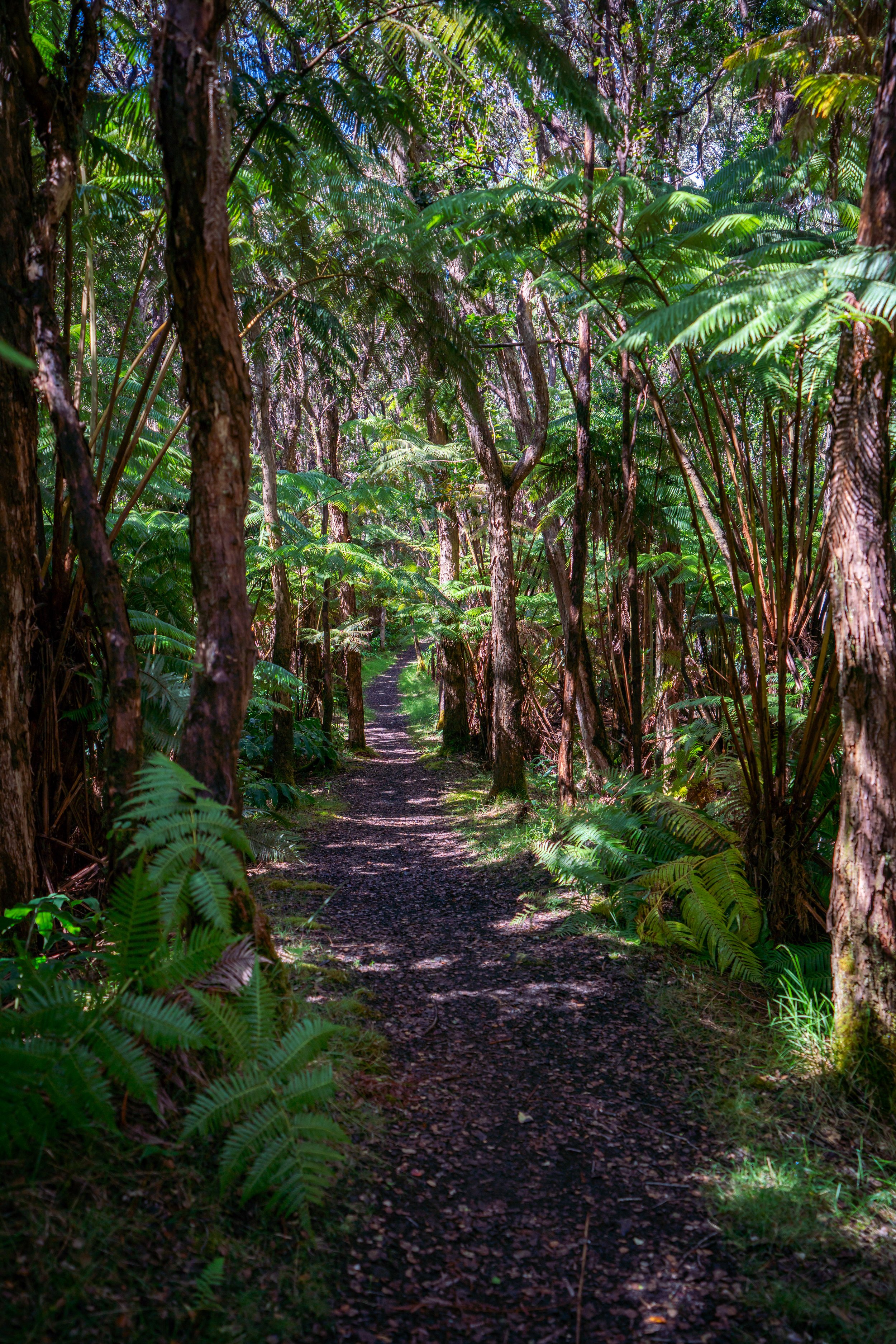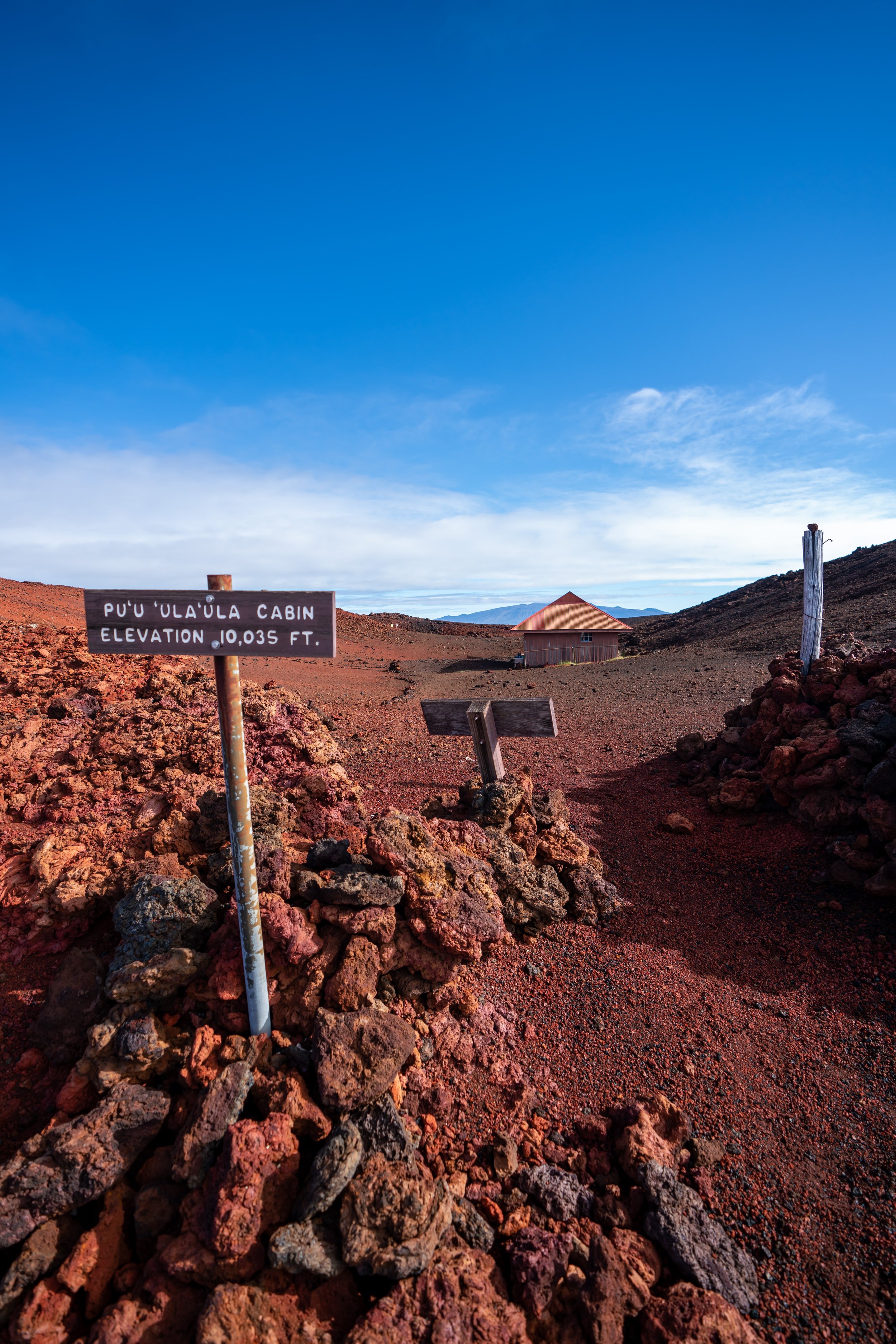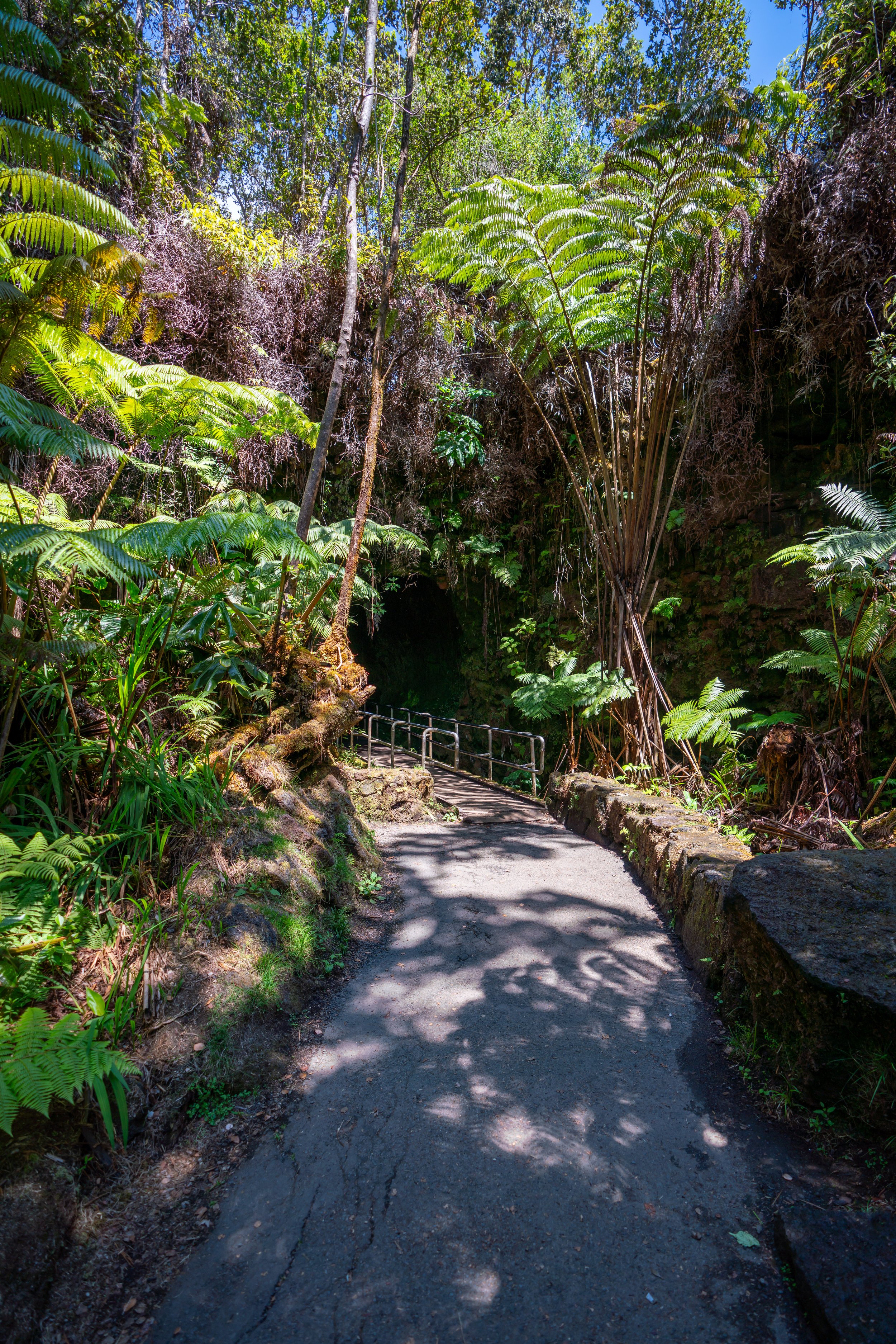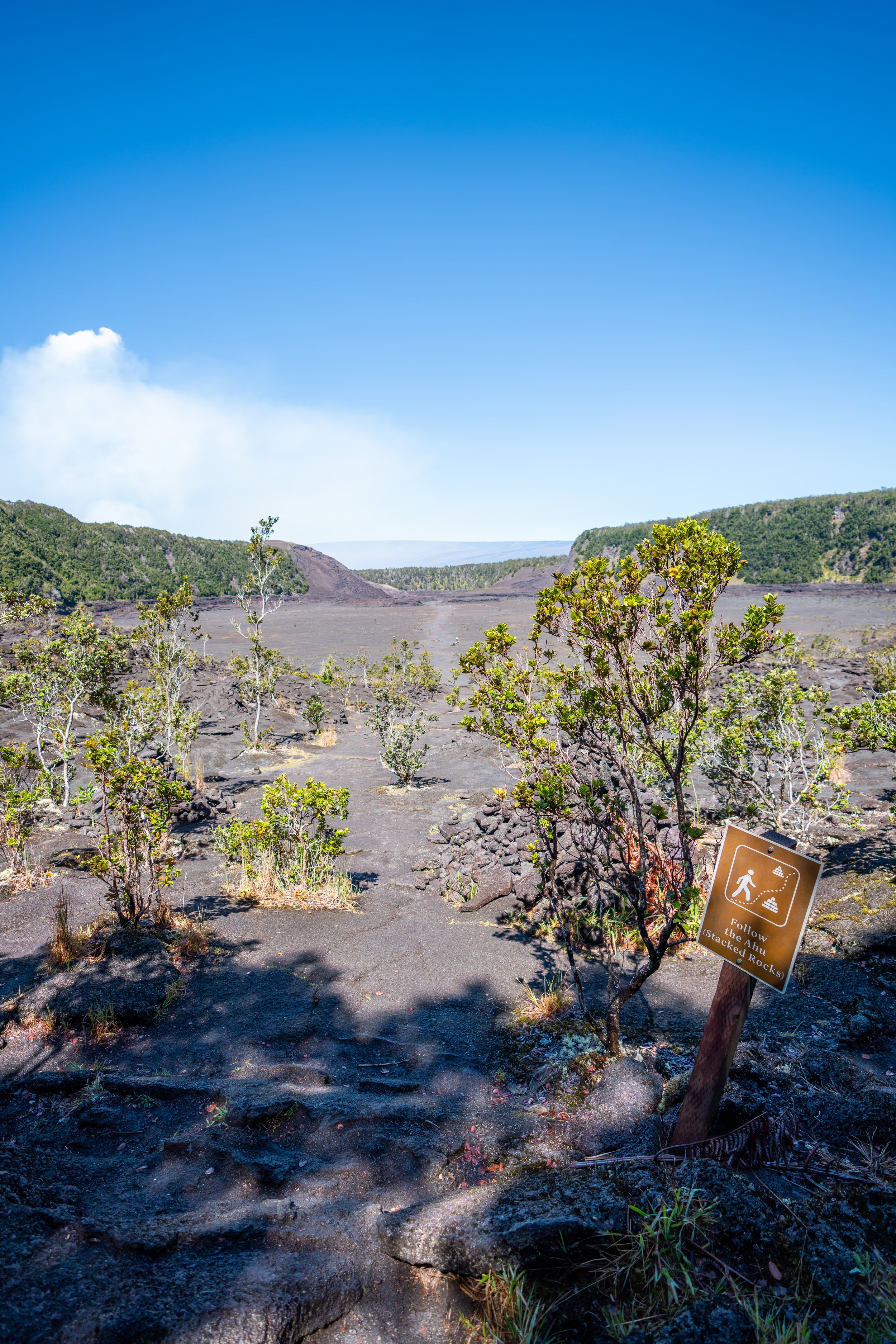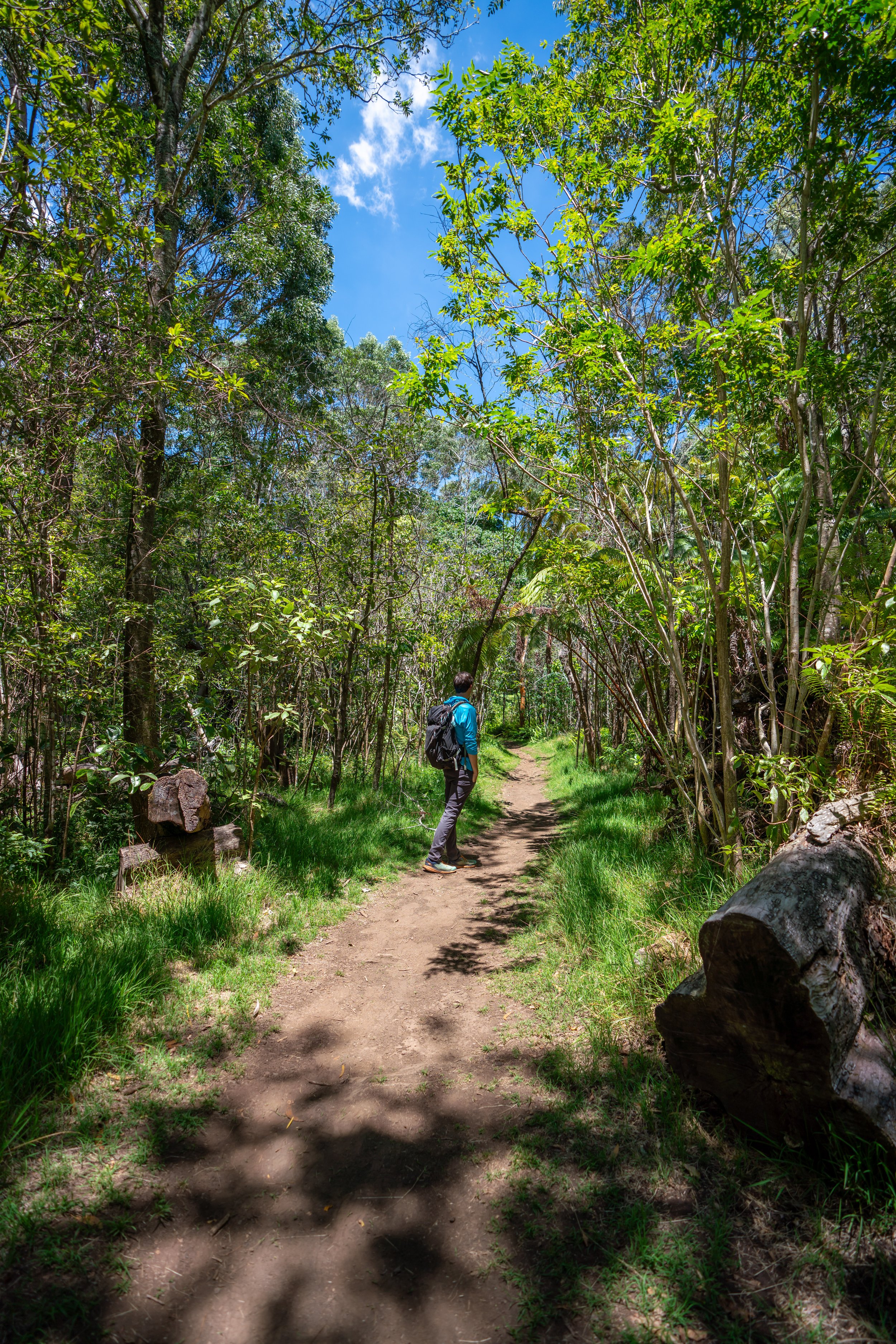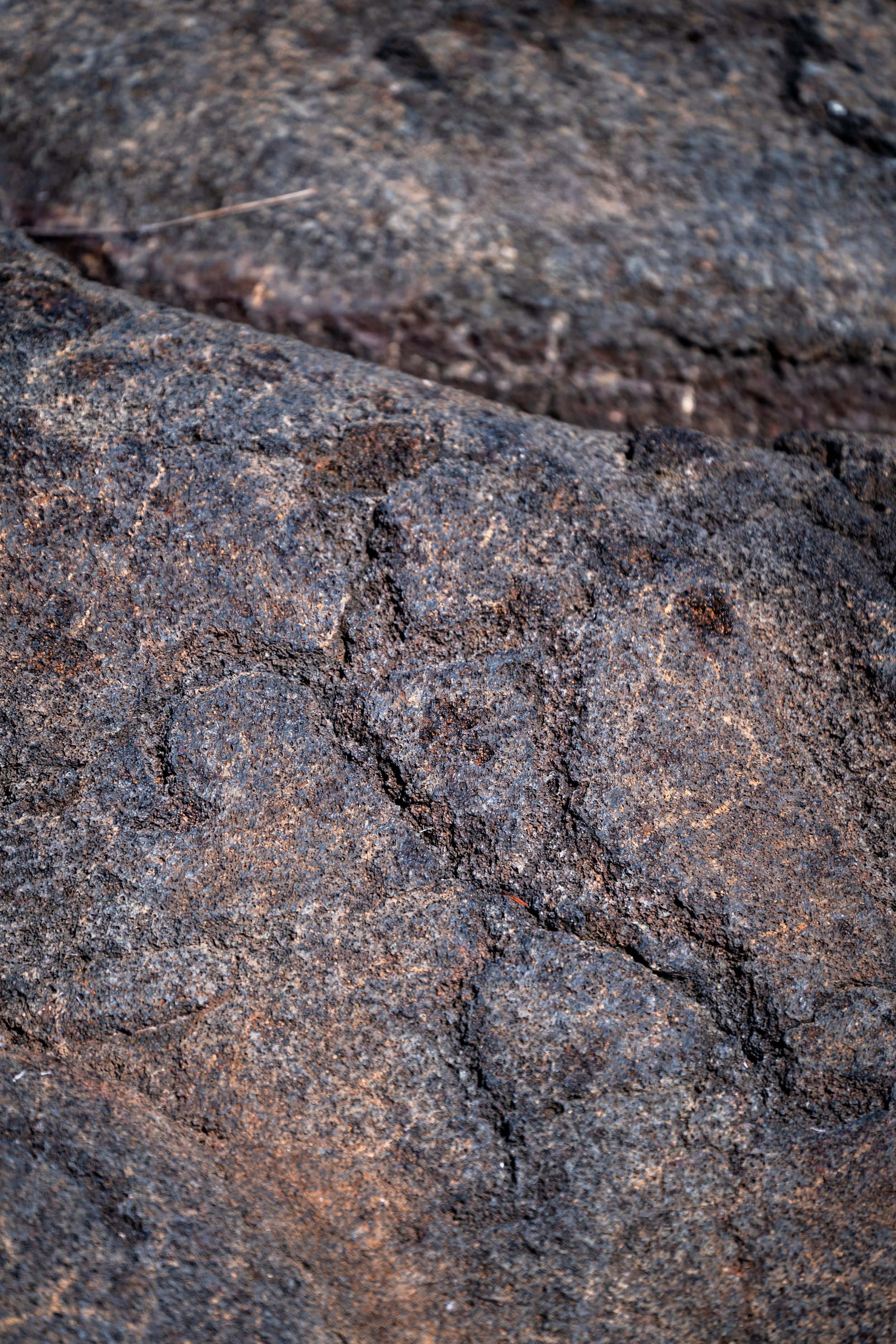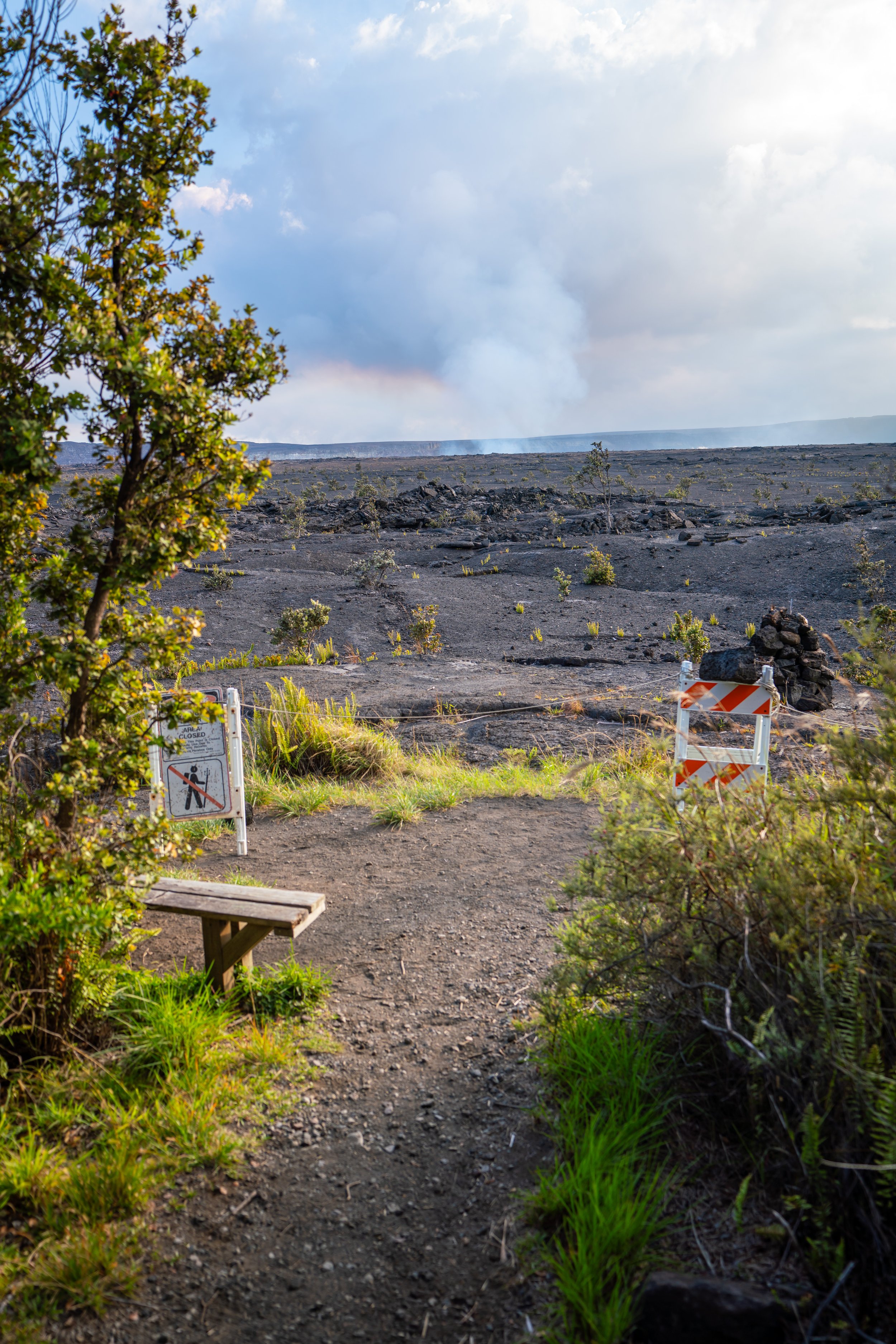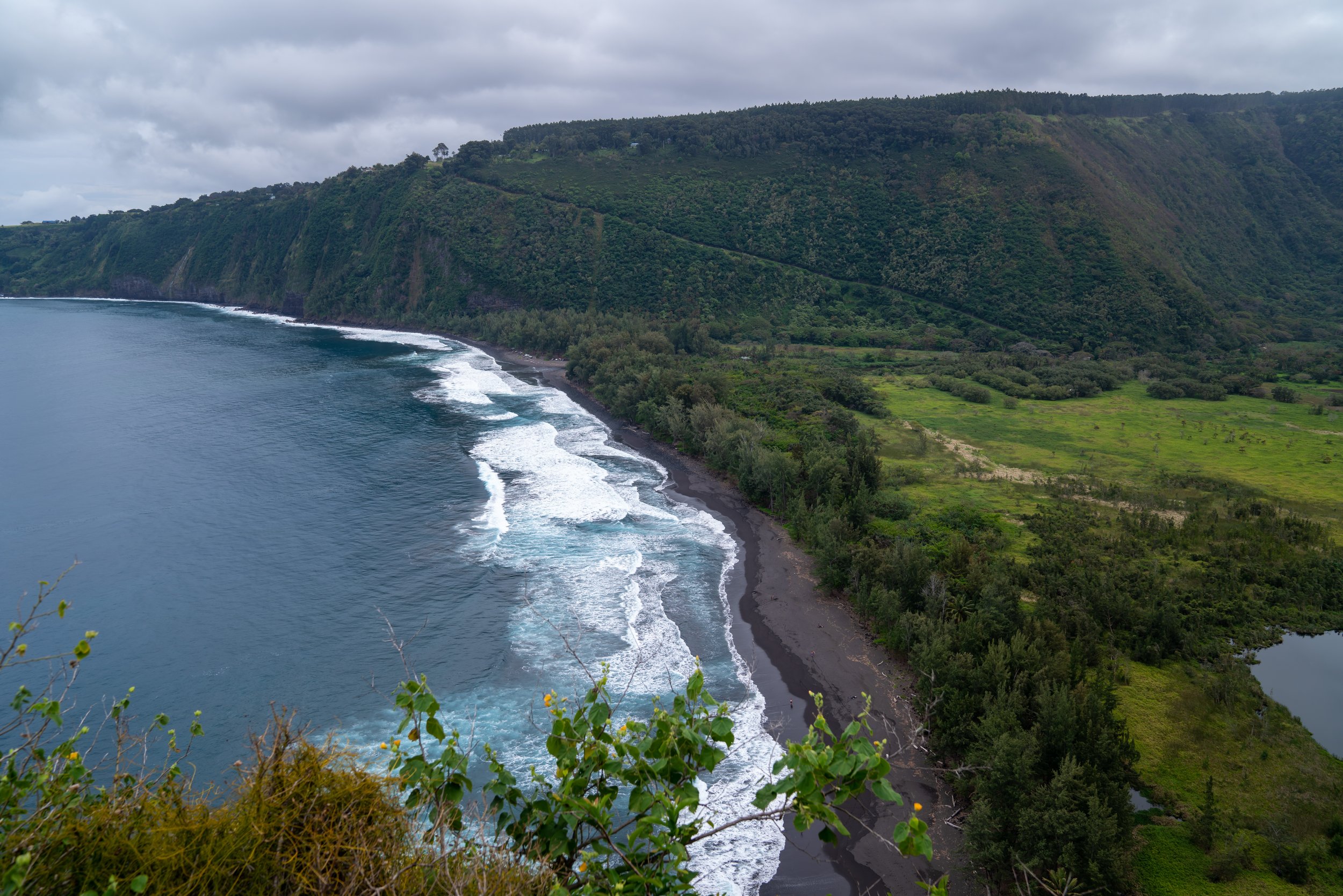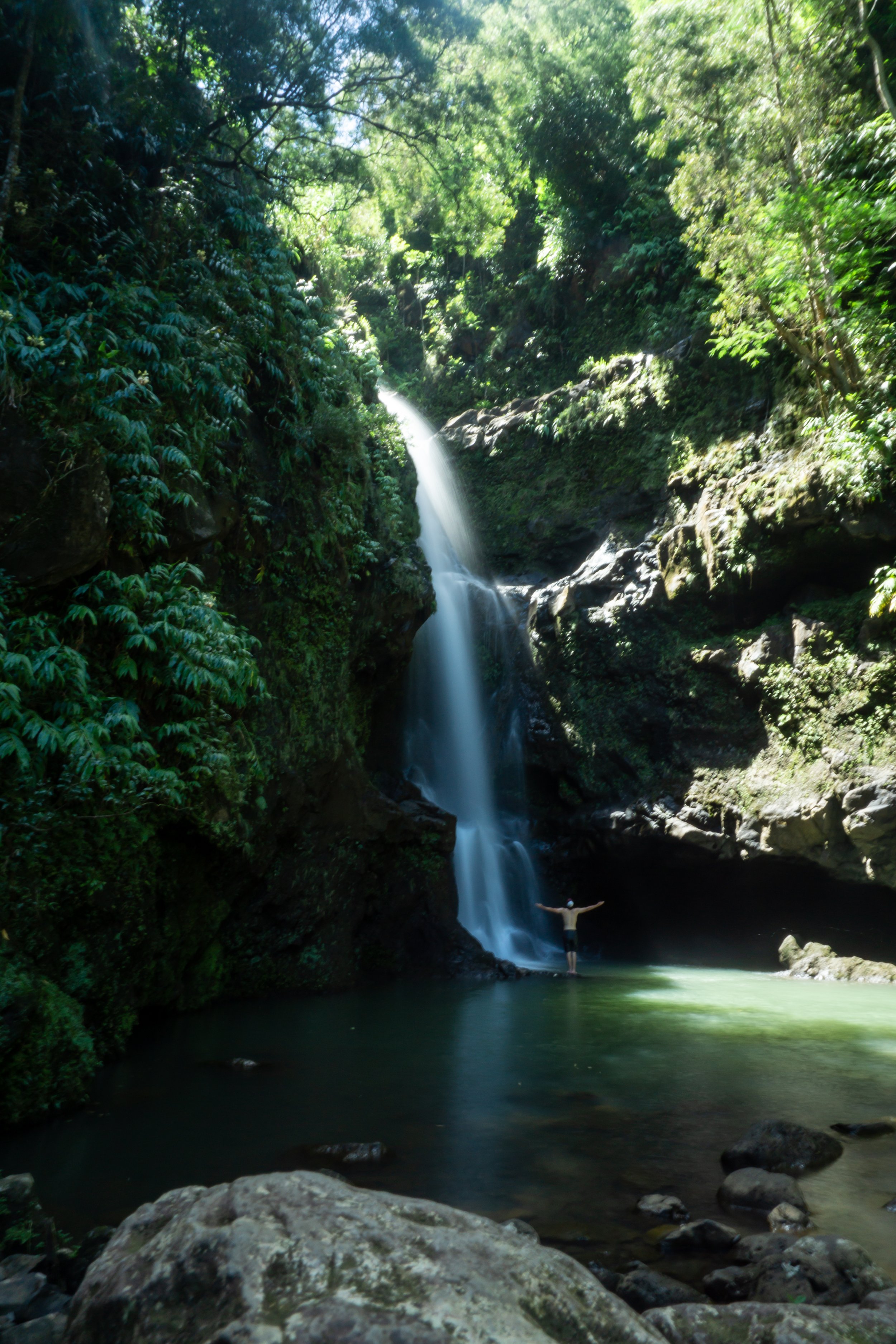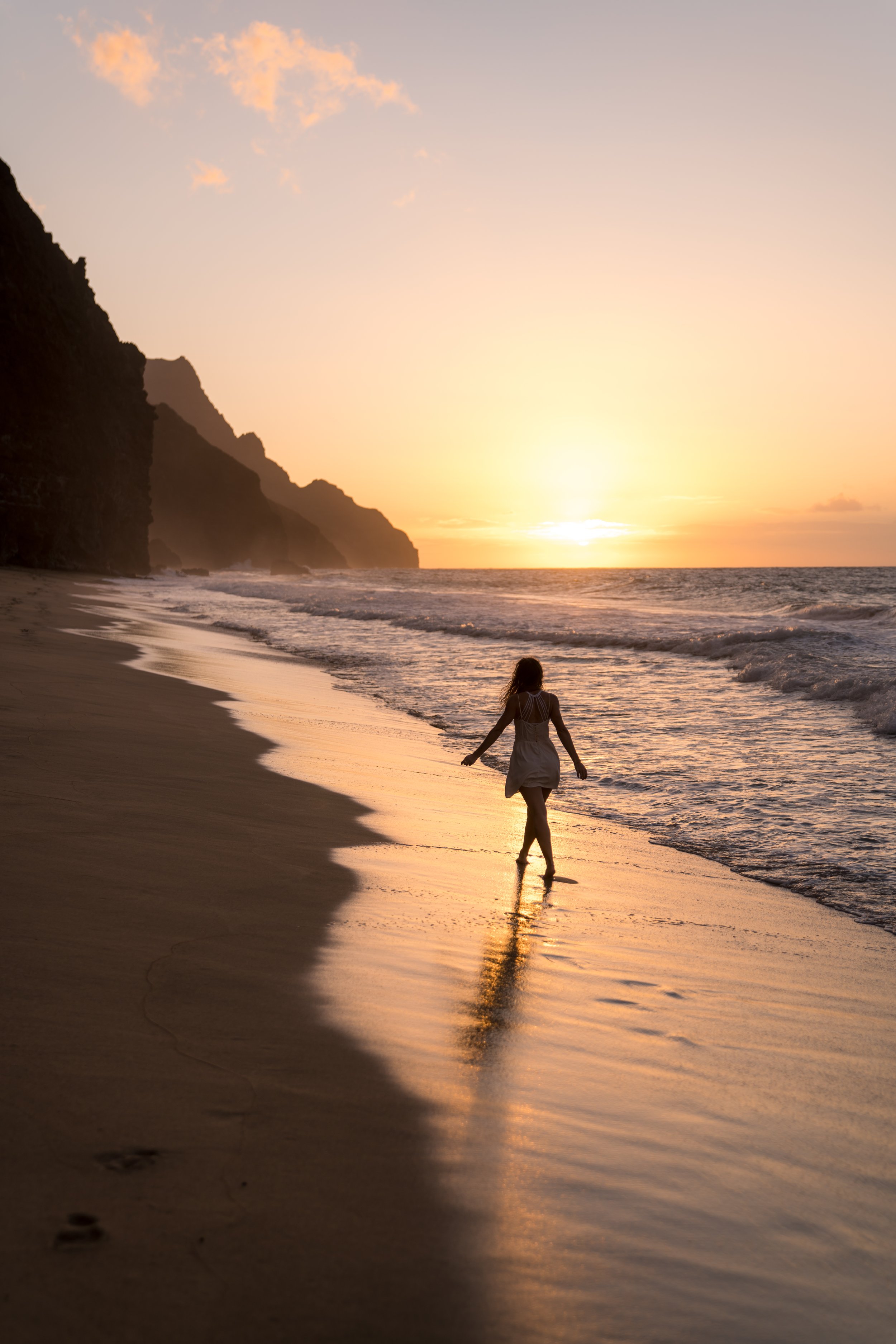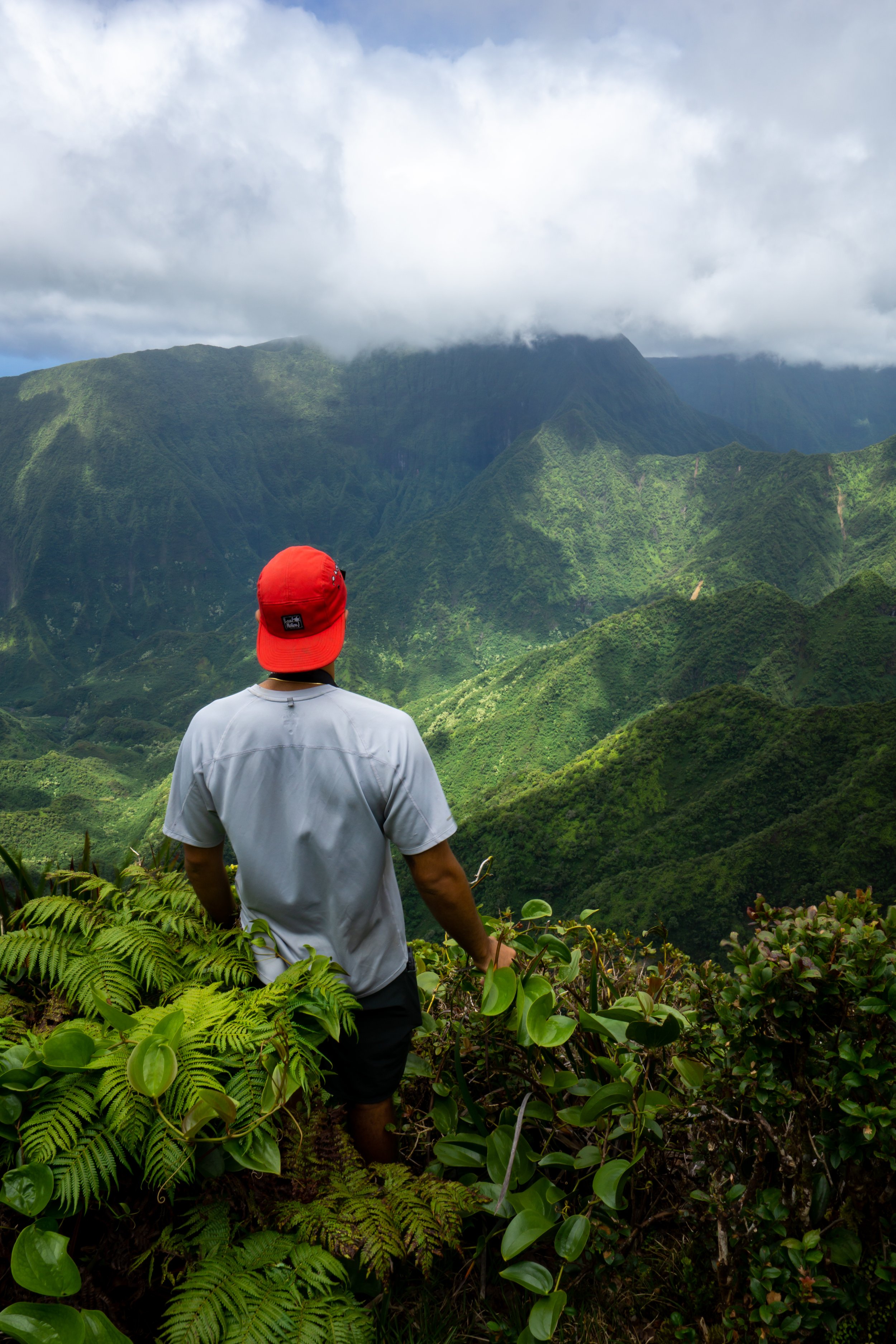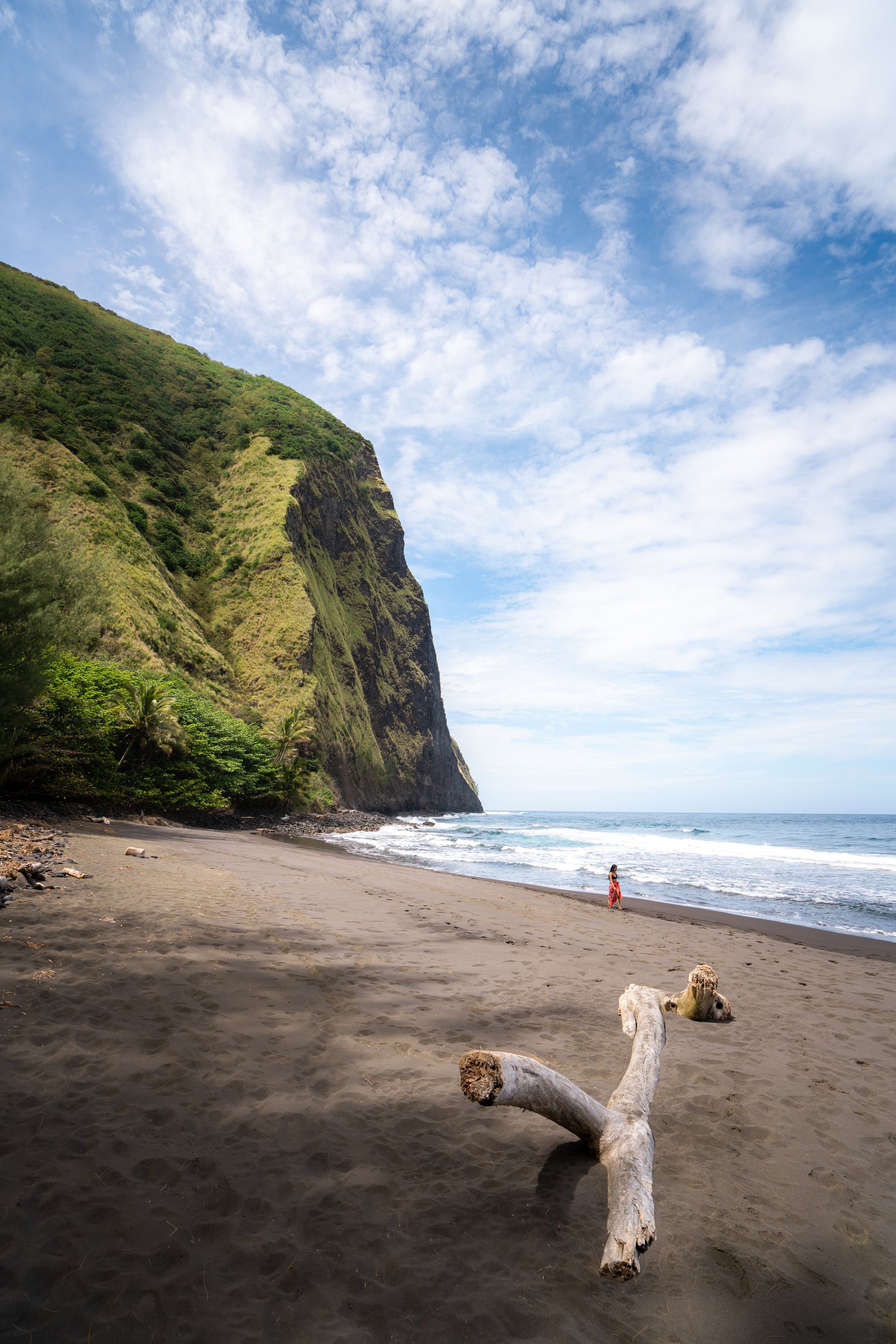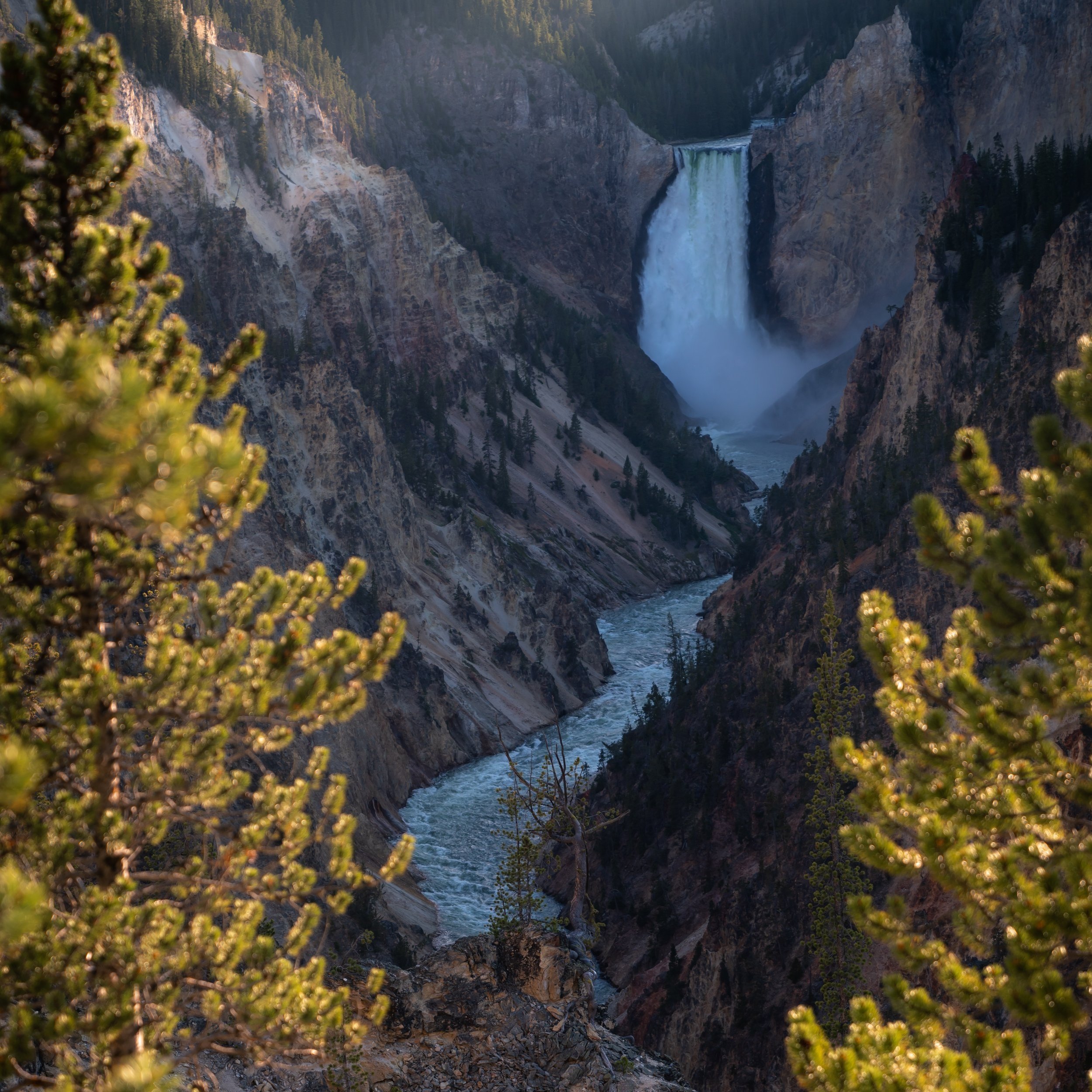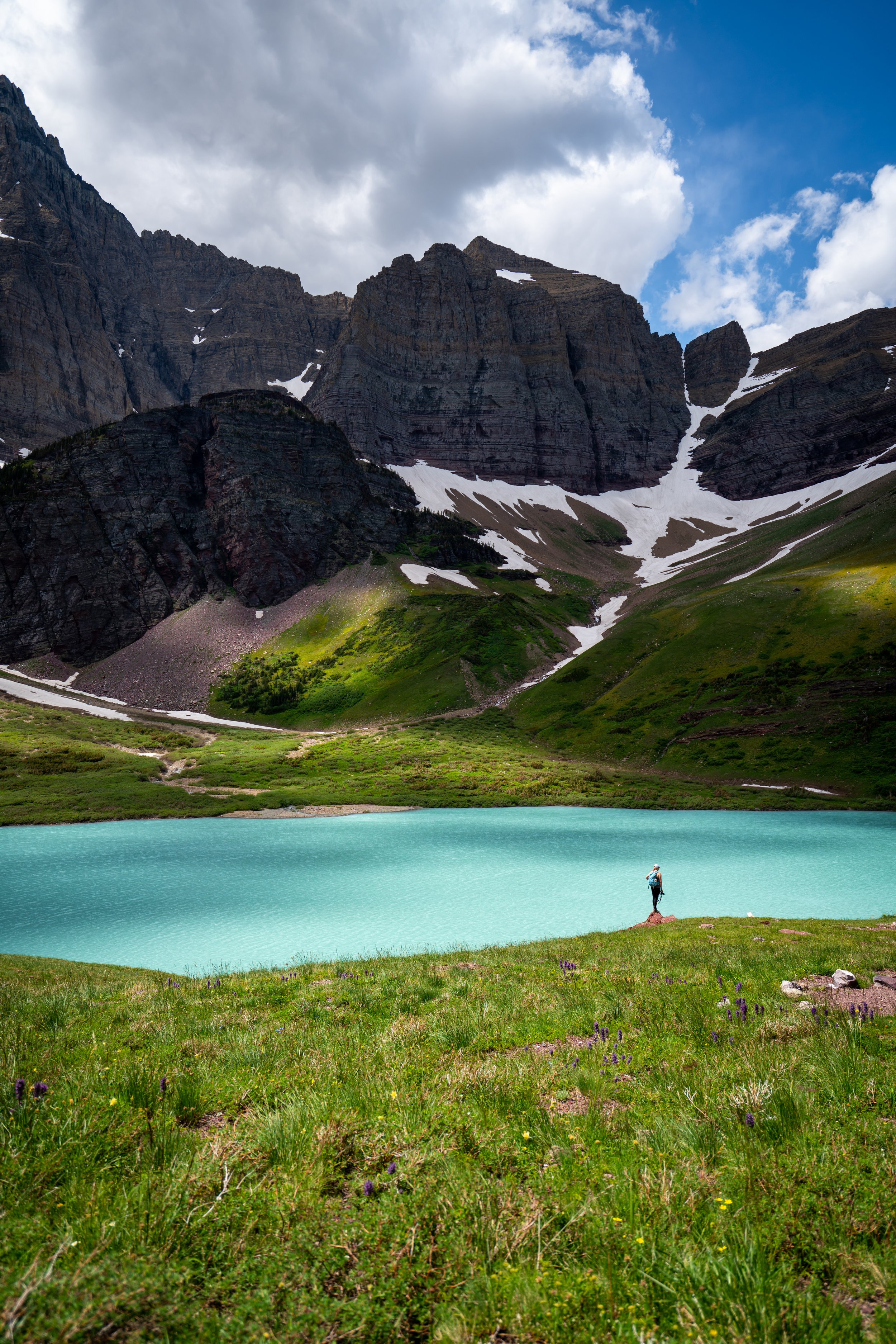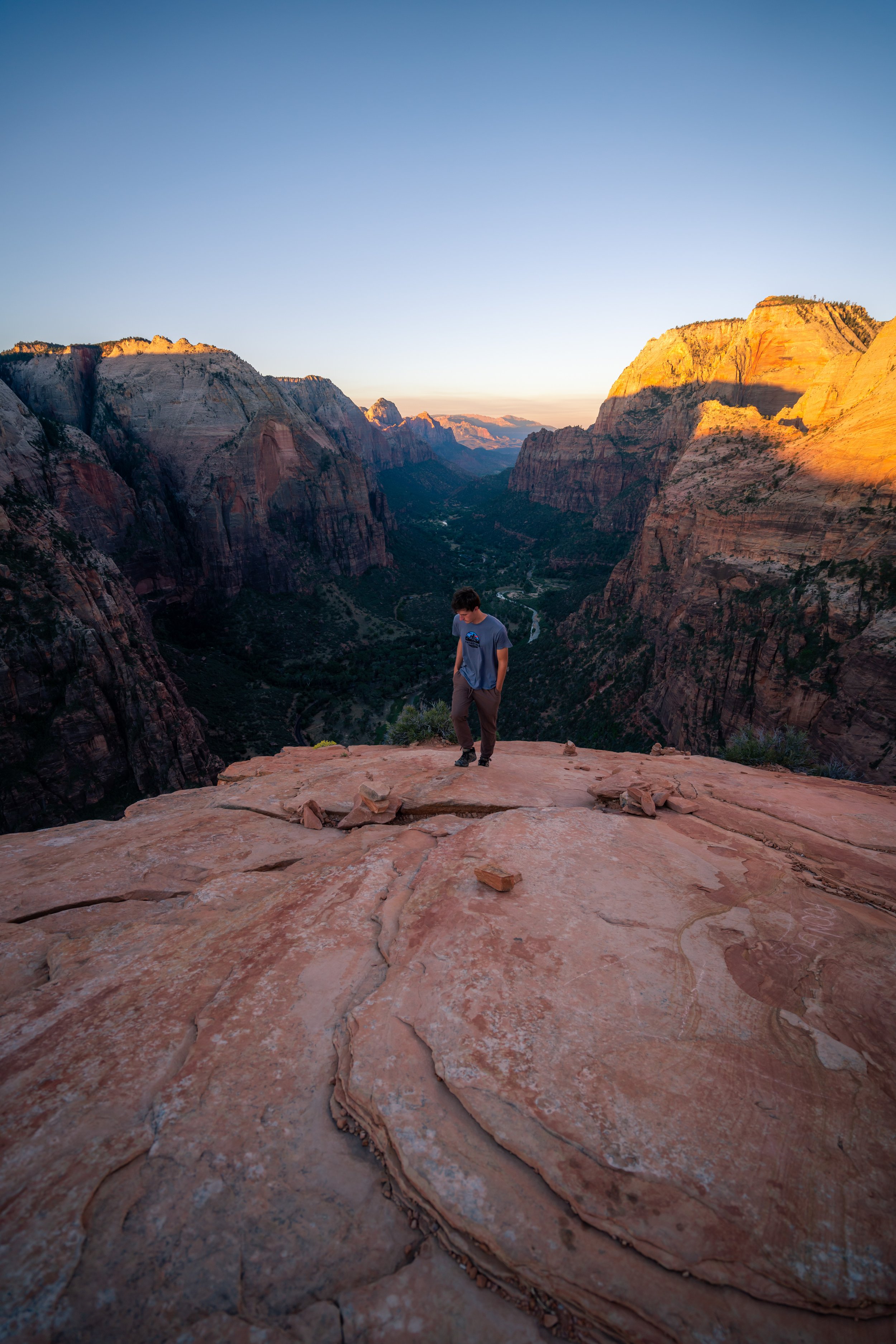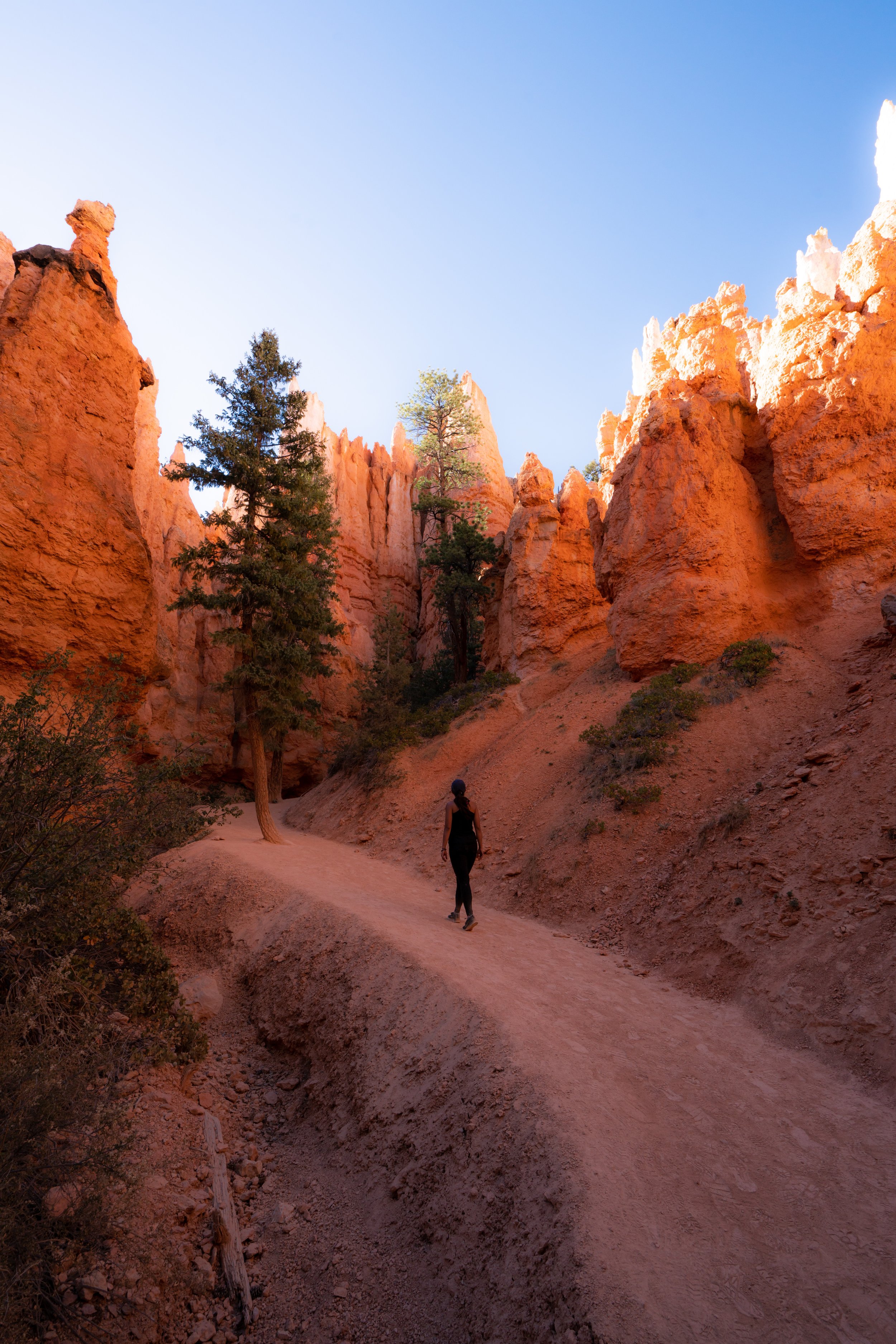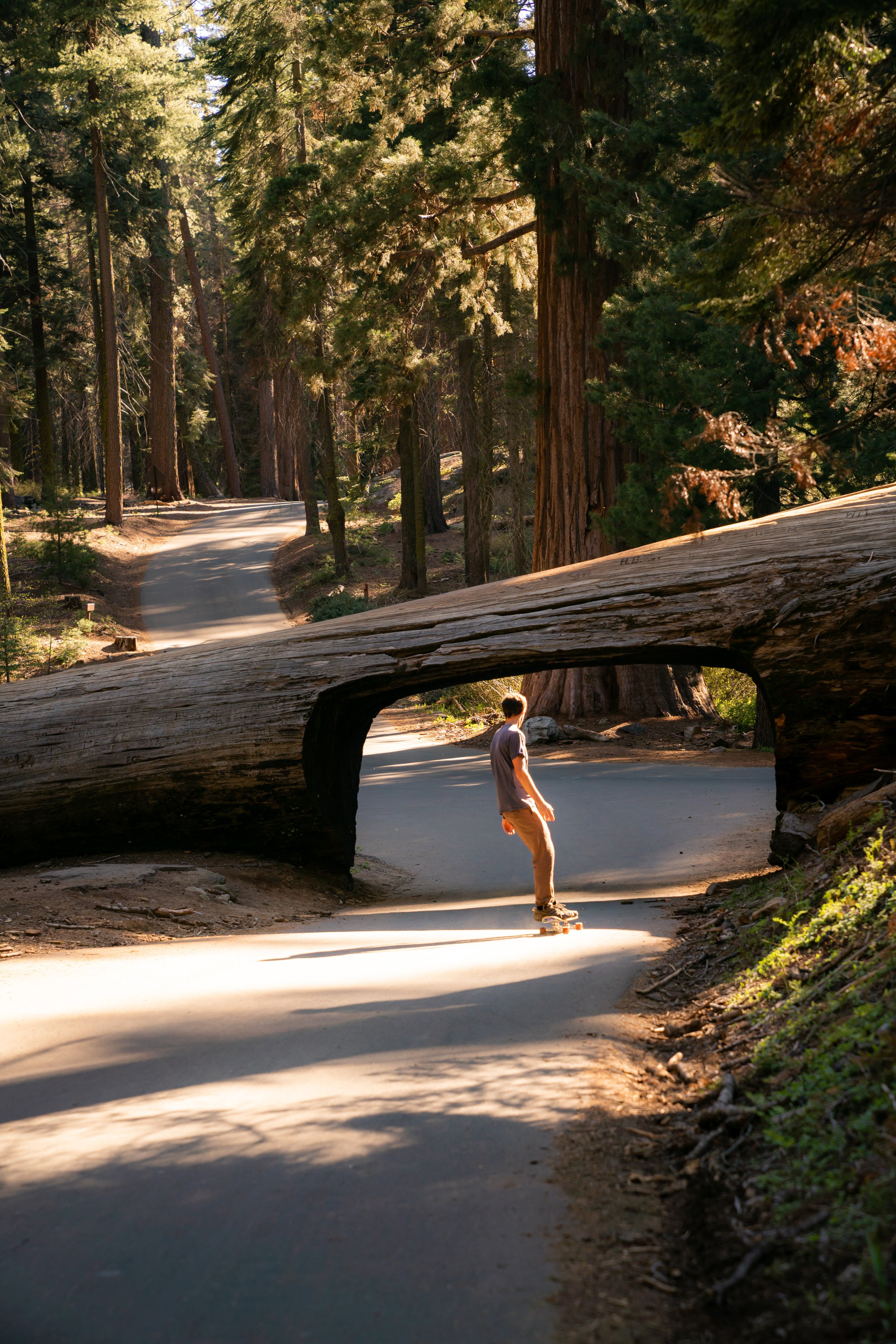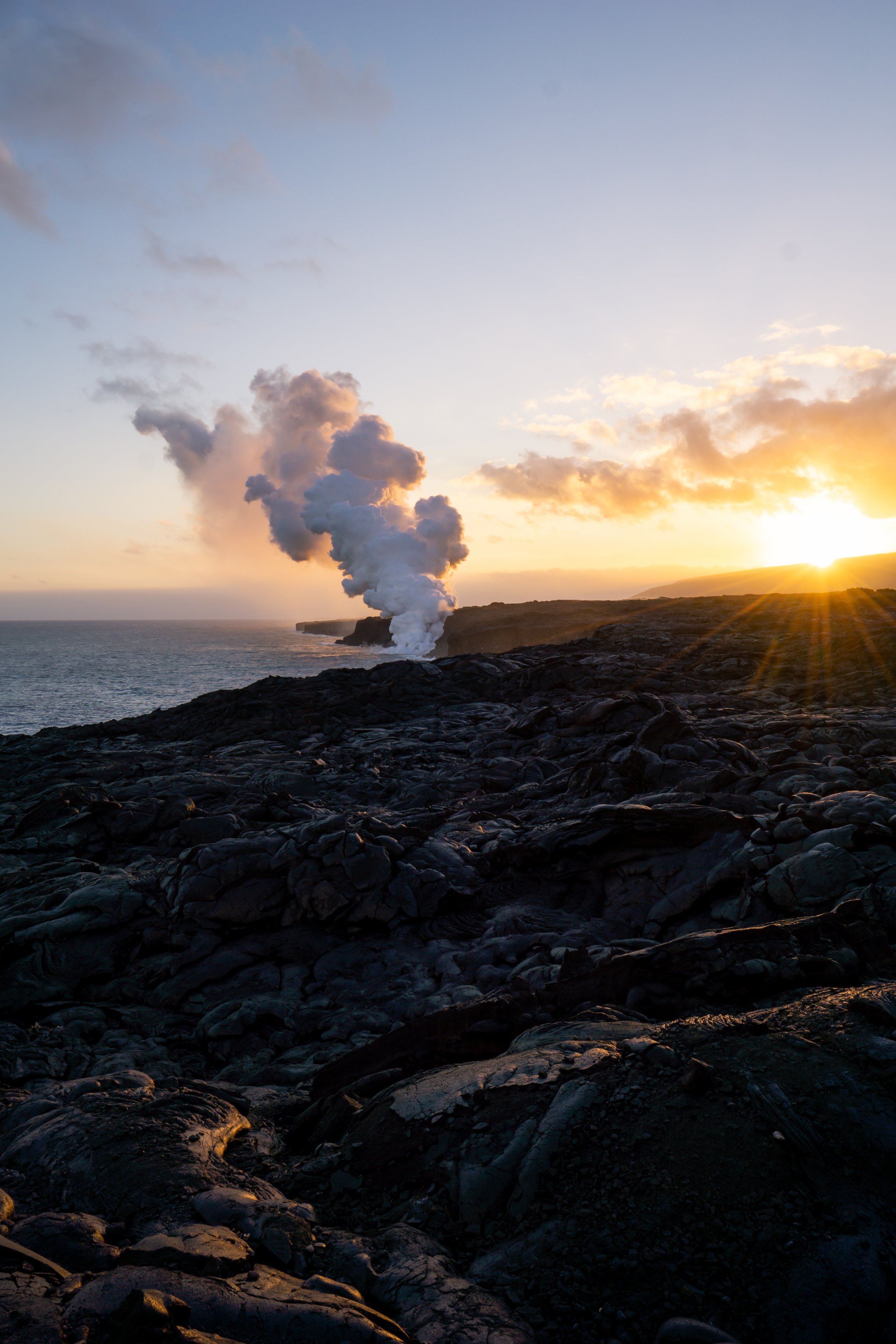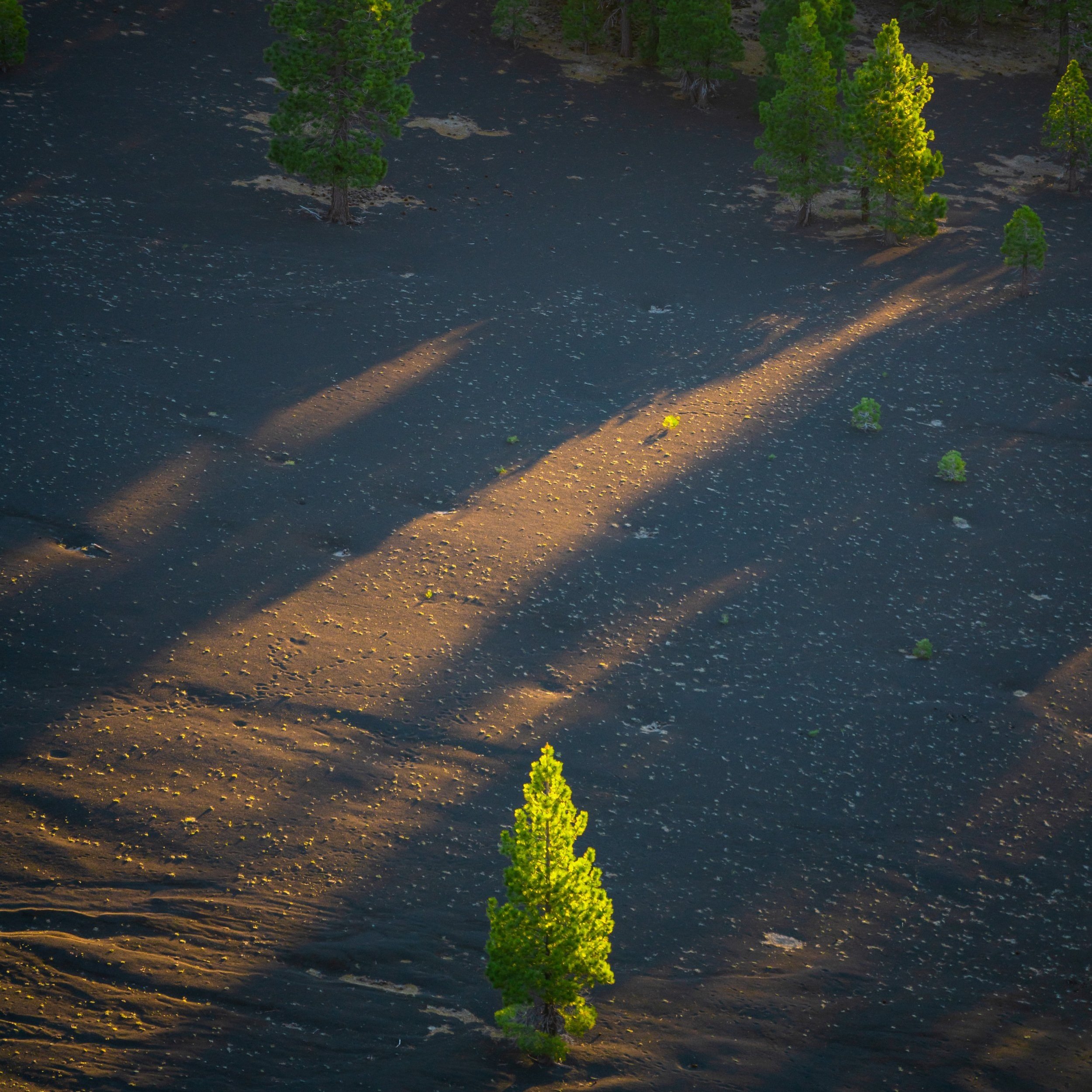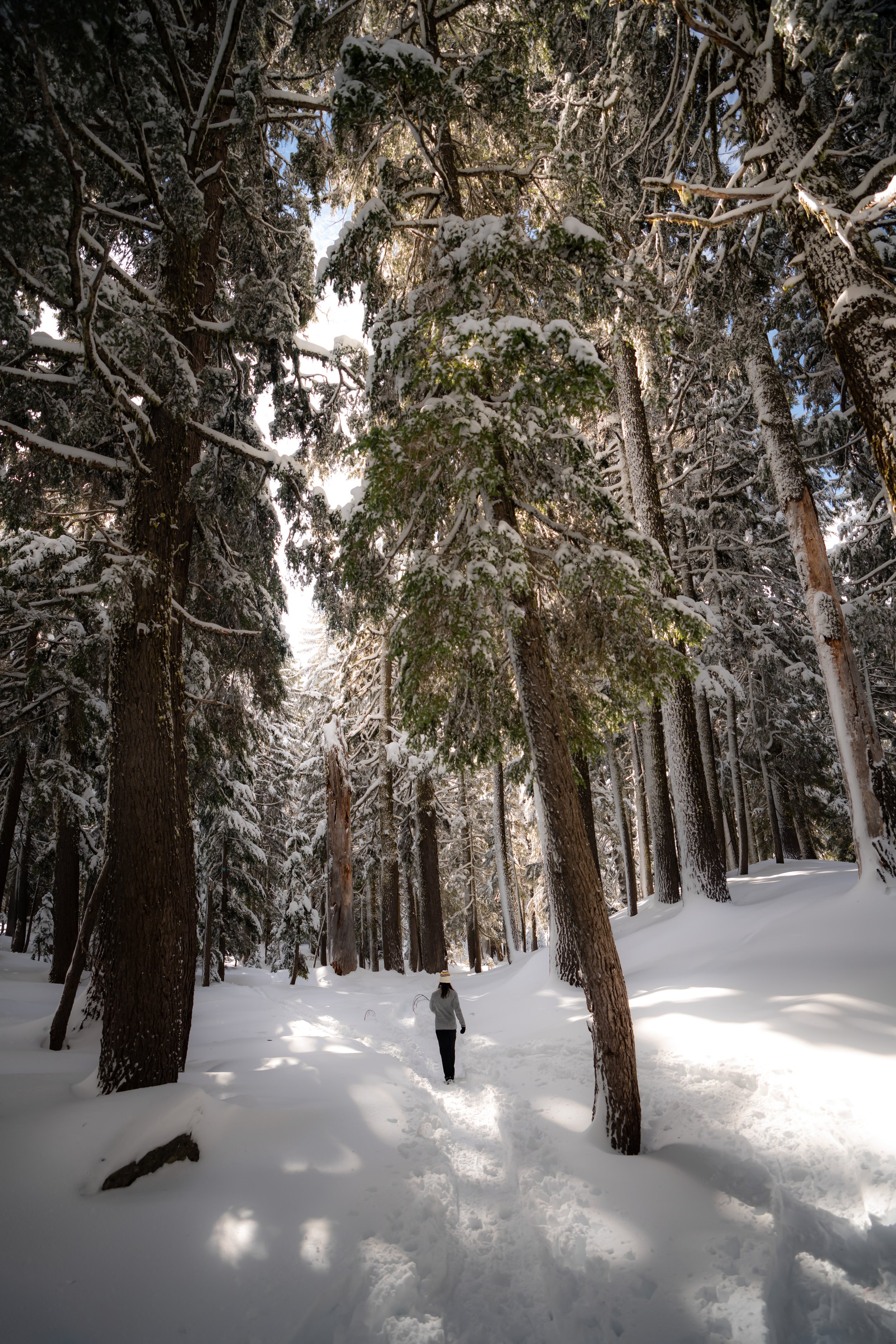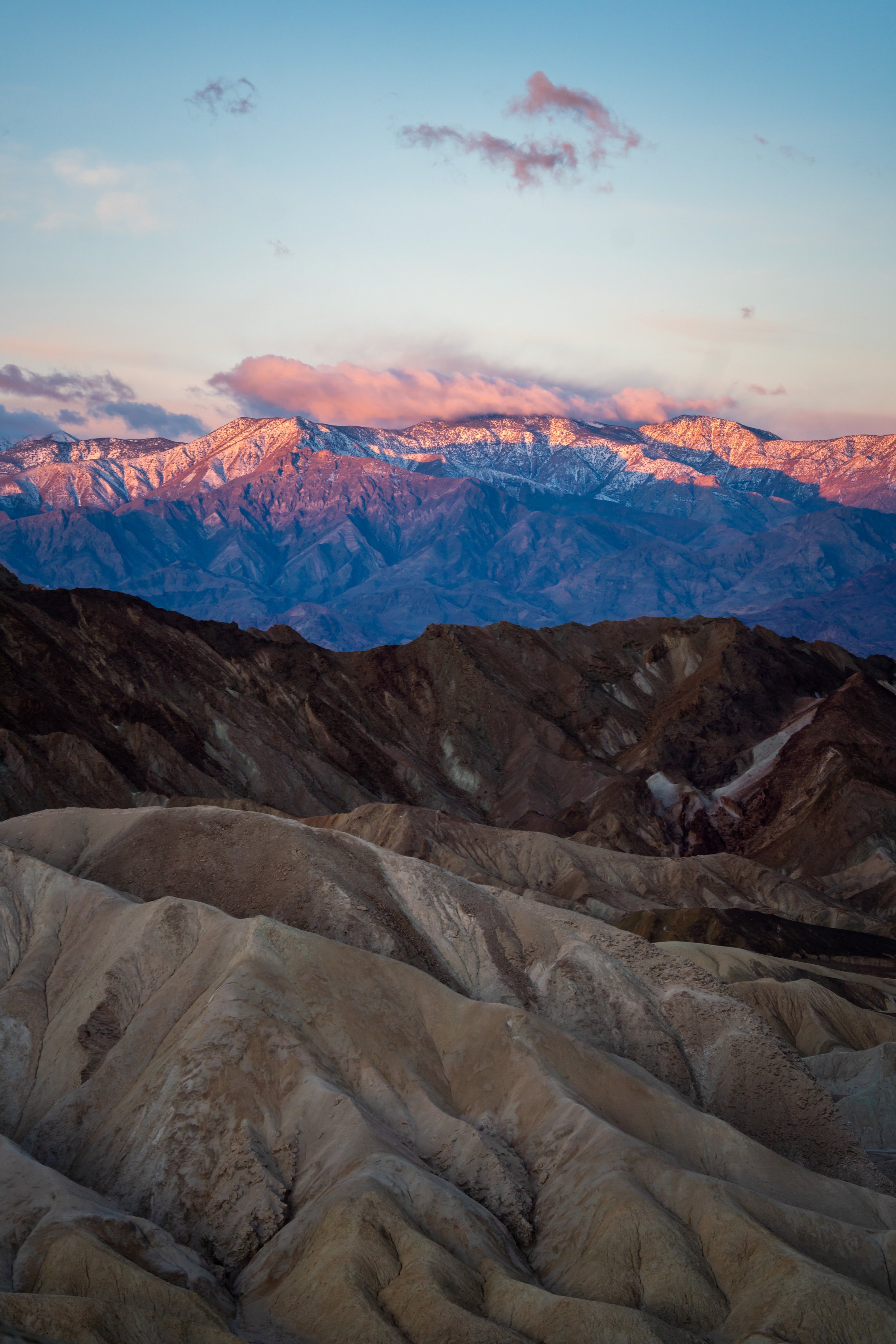Hiking the Haʻakulamanu (Sulfur Banks) Trail in Hawaiʻi Volcanoes National Park
Distance: 1.3 miles / 2.1 km
The Haʻakulamanu Trail, also called the Haʻakulamanu Sulfur Banks Trail, in Hawaiʻi Volcanoes National Park is one of the most geologically unique day hikes near the Kīlauea Caldera, and it’s one that I often compare to boardwalk trails in Yellowstone, like the Norris Geyser Basin.
I say this because the Haʻakulamanu Sulfur Banks also traverse a very similar boardwalk to that of Yellowstone—or even Bumpass Hell in Lassen Volcanic—where the trail passes by a number of steaming volcanic vents that smell much like rotten eggs!
That said, the trail through the Haʻakulamanu Sulfur Banks can be treated as an out-and-back hike, but it is more commonly treated as a loop with the Crater Rim Trail across Crater Rim Drive, which is what’s reflected in the distance above.
Haʻakulamanu Trailhead Parking
Parking for the Haʻakulamanu (Sulphur Banks) Trail is located in the same parking lot as the Kīlauea Visitor Center.
Generally speaking, finding a parking spot at the visitor center is never too difficult, but the area typically gets much more busy by midday.
Google Maps Directions: Kīlauea Visitor Center
My Hawaiʻi Hiking Checklist
Osprey 3L Water Bladder - The Osprey 3L water bladder is the most universal hiking and backpacking water bladder on the market, and it’s my go-to because of the slide-off seal that allows it to be quickly filled from the top. Additionally, individual parts are easily replaceable, such as the bite valve.
Blister / Heel Protectors - I swear by these cheap, amazing heel protectors to prevent blisters for nearly every kind of hiking and backpacking that I do!
Black Diamond Headlamp - Personally, I recommend the Black Diamond Storm because it is one of the brightest, lightest, and longest-lasting headlamps on the market—and trust me, the weight-to-battery-life ratio really does matter!
Hiking / Trail Running Shoes - Depending on the type of trail, I prefer to use either the Keen Targhee for longer, more rugged hiking or the HOKA Zinal Trail-Running Shoe for lighter, less intense trails. In either case, both have been amazing to me for many years across countless environments, and both can be found in men’s and women’s sizes. - (Men’s Keen / Women’s Keen) (Men’s HOKA / Women’s HOKA)
Waterproof Rain Shell - You never know when it may rain, and I’ve learned over the years that a rain shell is far better than a rain jacket. By this, I mean that it’s best to have something that the water will roll right off of, which is why I recommend the Patagonia Torrentshell 3L available in both men’s and women’s sizes.
High SPF Sunscreen - Packing high-SPF sunscreen is a must for long days outside!
Hiking the Haʻakulamanu Trail
The Haʻakulamanu Trail begins on the far side of the first crosswalk, as if you were walking to the Volcano House.
From here, the Sulphur Banks Trail follows a paved path for the next 0.2 miles (0.3 km) before reaching the boardwalks through Haʻakulamanu.
Be sure to stay on the trail, as there are numerous stories of visitors receiving serious and life-threatening burns for venturing off the path.
Haʻakulamanu (Sulphur Banks)
Haʻakulamanu quite literally means a "gathering place for birds."
While this may not be as true as it once was, Nēnē, the Hawaiʻi state bird, and various other native forest birds can still be seen flying in the ʻŌhiʻa canopy up above.
Overall, Hawaiʻi Volcanoes National Park is one of the better refuges for these native forest birds against disease-carrying mosquitoes that decimate their populations at lower elevations.
Please don’t leave the boardwalk.
Kūkamāhuākea
After Haʻakulamanu, the trail begins to venture toward Kūkamāhuākea, which translates to a "place where steam rises."
While much of Kūkamāhuākea is off trail to the west, I think it’s important to recognize the many place names that Hawaiians had for these different areas.
Crater Rim Drive
After 0.7 miles (1.1 km), the Haʻakulamanu (Sulphur Banks) Trail crosses Crater Rim Drive, leaving only 0.1 miles (0.2 km) left to reach the Crater Rim Trail.
As mentioned previously, Haʻakulamanu could be treated as an out-and-back trail, but it’s more commonly linked up with the Crater Rim Trail across the road, which is roughly 0.25 miles (0.4 km) shorter to get back to the Kīlauea Visitor Center.
Crater Rim-Haʻakulamanu (Sulphur Banks) Junction
Distance to the Kīlauea Visitor Center: 0.5 miles / 0.8 km
Where the Sulphur Banks Trail ends, the Crater Rim Trail begins.
Go left to complete the Haʻakulamanu-Crater Rim Loop that returns to the Kīlauea Visitor Center only 0.5 miles (0.8 km) away.
If you’re interested in hiking the entire Crater Rim Trail, I highly encourage you to check out the different sections around Kīlauea in my separate post, as this small 0.5-mile (0.8 km) stretch is only a fraction of the entire trail. In my opinion, the best sections begin past Nāhuku (Thurston Lava Tube).
Read My Separate Post: Crater Rim Trail
Halemaʻumaʻu Junction
After about 0.5 miles (0.8 km), the Crater Rim Trail splits with the Halemaʻumaʻu Trail that leads down to the edge of the native forest within Kīlauea Crater.
Go straight/ up the stairs at this junction to continue hiking the Crater Rim Trail toward the Kīlauea Visitor Center and the Volcano House.
Kīlauea Visitor Center Junction
At the next junction, go left to finish the Haʻakulamanu-Crater Rim Loop.
Native Plants on the Haʻakulamanu Trail
The Haʻakulamanu-Crater Rim Loop Trail passes through a variety of native forest habitats where you can expect to see ʻŌhiʻa lehua, Naupaka, Kōlea, ʻIliahi, Akaʻawa, and ʻIlima, to name just a few.
If you’re interested in identifying these and other native plants when you hike, I highly encourage checking out my separate post. It’s all of my observations from Hawaiʻi Volcanoes and other adventures from across the islands.
Read My Separate Post: Native Hawaiian Plant Guide
More Hawaiʻi Volcanoes Adventures
If you’re interested in reading about some more amazing adventures within Hawaiʻi Volcanoes National Park, check out my separate posts below!
Best Hotels & Vacation Rentals on Hawaiʻi Island
Since Hawaiʻi Island is such a big island, I recommend starting your search on VRBO to find places in both Kona and Hilo.
This way, you can plan your adventures on all sides of the island without having to drive too far.
Hawaiʻi Island Airport-Hotel Shuttle
Prices on ride-share apps like Uber/ Lyft cannot beat the price of booking your hotel or vacation rental shuttle prior to arrival.
That being said, the shuttle option below is incredibly cheap, and it’s a great option to get to accommodations across the Kailua-Kona side of the Big Island!
Best Way to Book Rental Cars!
I travel quite a bit, and I know firsthand that finding a good rental car deal can be a challenge, but that’s why I recommend comparing all of your options with Discover Cars.
In short, Discover Cars is a well-known, reputable business that allows you to search for the best deal across companies, and they have the best full-refund cancellation policy I’ve ever seen, valid up to 72, or sometimes even 48, hours prior to your reservation!
Book Here: Discover Cars
Visiting Other Islands
If you are visiting Hawaiʻi Island or heading to another island, check out some of my personal recommendations for Oʻahu, Maui, Kauaʻi, Molokai, Lānaʻi, and Hawaiʻi Island (Big Island) in these separate posts.
If you’re trying to decide which island is right for your visit, check out my overview about each island in the post below.
Read My Separate Post: What is the Best Hawaiian Island to Visit?
What is the Best Time of Year to Visit Hawaiʻi?
The weather in Hawaiʻi can often appear to be warm and beautiful throughout the year, but in my experience, there is a lot more to consider when planning what time of year to visit the islands, such as what island you are considering, what sides of each island do you plan to stay, what activities are you most interested in, the wildlife, and countless other nuanced variables that can all impact the type of trip you can expect to have.
For these reasons, I highly recommend reading through my separate article to not only understand my thoughts regarding the best time of year to come to Hawaiʻi but also what you need to consider based on the time of year that you plan to visit.
Read My Separate Post: What is the Best Time of Year to Visit Hawaiʻi?
Safety
All hikes in Hawaiʻi should not be compared to trails outside of the islands, and hikers should exercise due caution on every adventure, given that many are extremely dangerous.
By this, I mean that Hawaiʻi is known for hot, humid weather, steep, dramatic, and unstable cliffs, and flash floods, which can occur without warning. Therefore, it is important that you check the local forecast, understand the physical condition of your entire group, and pack sufficient food and water before attempting any adventure.
Disclaimer
All information provided on this blog is for informational purposes only and is not intended to be a substitute for information or advice from qualified professionals or managing agencies.
Noah Lang Photography LLC makes no representations or warranties regarding the accuracy or completeness of the information provided here, and readers should use their own discretion, judgement, and seek professional advice where it is appropriate.
Furthermore, Noah Lang Photography LLC shall not be held responsible for any injuries, lost individuals, or legal issues arising from the use of information provided on this website, and if applicable, the above safety disclaimer should be referenced to provide a generic overview of the risks involved.
All said, the content on this blog is for the sole use of Noah Lang Photography LLC, and unauthorized use or reproduction of this content is strictly prohibited.
Safety
All hikes in Hawaiʻi should not be compared to trails outside of the islands, and hikers should exercise due caution on every adventure, given that many are extremely dangerous.
By this, I mean that Hawaiʻi is known for hot, humid weather, steep, dramatic, and unstable cliffs, and flash floods, which can occur without warning. Therefore, it is important that you check the local forecast, understand the physical condition of your entire group, and pack sufficient food and water before attempting any adventure.
As always, find the most up-to-date information and conditions on the official National Park website.
National Park Service: Hawaiʻi Volcanoes National Park
Disclaimer
All information provided on this blog is for informational purposes only and is not intended to be a substitute for information or advice from qualified professionals or managing agencies.
Noah Lang Photography LLC makes no representations or warranties regarding the accuracy or completeness of the information provided here, and readers should use their own discretion, judgement, and seek professional advice where it is appropriate.
Furthermore, Noah Lang Photography LLC shall not be held responsible for any injuries, lost individuals, or legal issues arising from the use of information provided on this website, and if applicable, the above safety disclaimer should be referenced to provide a generic overview of the risks involved.
All said, the content on this blog is for the sole use of Noah Lang Photography LLC, and unauthorized use or reproduction of this content is strictly prohibited.
U.S. National Parks Pass
Did you know that the same America the Beautiful Pass that grants access to all 63 U.S. National Parks can be purchased in advance at REI?
Yes, you can save time when you arrive by purchasing your National Park pass, along with your other outdoor gear, at REI before traveling to the park!
More U.S. National Parks
If you’d like to read more about some of my best recommendations when visiting other U.S. National Parks, check out some of my other posts below!
Disclosure
This post is not sponsored.
However, some of the links in this post are affiliate links, which means that I may earn a small commission if a purchase is made through one of those links. This commission comes at no additional cost to you, and I only recommend products that I personally use and believe will add value to my readers. Thank you for your support, which enables me to continue creating more!
To read the full privacy policy, click here.
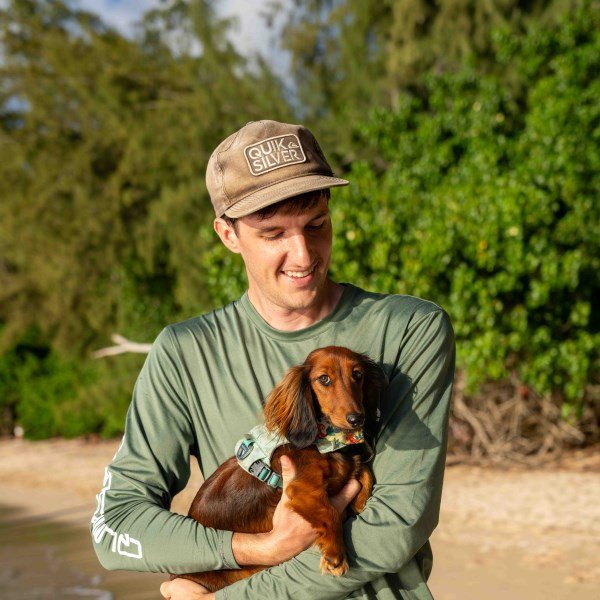
About This Blog
Noah Lang Photography, also known as @noahawaii, is 100% reader-supported!
I do not accept guest articles or sponsored content of any kind on my blog, which is why, if you enjoy the outdoor and travel content I create, please consider buying me a coffee!
I appreciate your support, which helps me continue to keep this blog alive!











